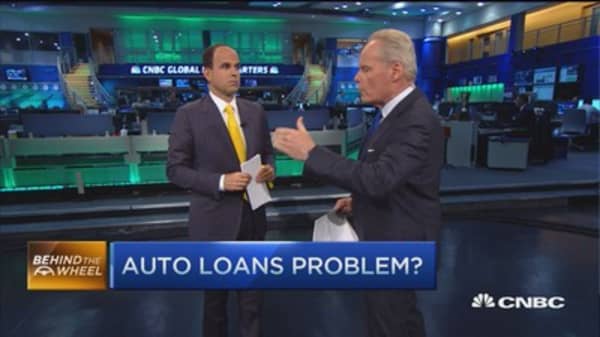"What do we have to do to get you into this car today?"
Increasingly, it seems like the answer to that question is: "lease it to me!"
CNBC's Phil LeBeau is reporting that a record number of Americans are leasing cars. And the simple reason is the initial price. It can often cost as much as $100 less per month to lease versus buying the same car. That doesn't mean that the cost of leasing is cheaper than buying over the long haul, (in fact, it almost never is). But with the average price of a new vehicle soaring to $31,000, finding a cheaper way to at least get into that car today is becoming more popular and important.
Read MoreBuying a home? Don't make these costly mistakes
Leasing is also more popular because over the years, the automakers have really expanded the number of lease options and made them available to more and more customers. Give American finance and debt experts enough time and leeway in any market, and they will make new markets and expand existing ones.
And leasing is really just one part of the story. Banks have adjusted and expanded car loans even more over the years. The average car loan now runs 67 months and long term used car loans that stretch from 73 to 84 months long are much more common. And the new choices in loans are a major reason why we learned today that new car sales have hit their strongest pace in more than nine years.
Now comes the dark side of the story: these new loans are almost all costlier for the buyers. And The Profit's Macus Lemonis said on Power Lunch today that these longer leases and loans are a sign that many people are spending more than they can afford. He's probably right, and you can almost hear the warnings from financial watchdogs in Washington. That's because the kind of financial arrangements that cost less at the beginning in order to get more people into everything from cars to homes are a particular bugaboo for people like Senator Elizabeth Warren and others who generally think the public needs to be protected from making these kinds of decisions.
I know they have a point about the increased risk and cost, but risk and cost are what make an economy grow. As long as the consumers are reasonably informed of the added costs and risks, there's no good reason for government intervention. This goes beyond the vehicle market, because exotic new loans help remove barriers to lots of other markets, and they also increase and spread risk. Fine. But if politicians insist on playing a role in this process, as they always do, then they should focus on limiting the economic damage and responsibility to the actual buyers and lenders and not the rest of the taxpayers. I know, I'm dreaming. Promoting personal responsibility goes against every political force on Earth.
Read MoreFood, water & Obamacare
But personal responsibility isn't just the vanguard of a functioning free market system, it's the key to a well-functioning and free society. These kinds of leases and loans ask the buyers to take more personal responsibility and get more informed, and that's the hidden positive in this process. A maddening aspect of the subprime loan market before the housing crash was that predatory lenders took advantage of a lot of borrowers who did not even know they could have qualified for a prime loan. These incidents should have served as a lesson to everyone to get more informed, which is never a bad idea. But it seems like the lesson too many potential borrowers and politicians learned was that all subprime loans are bad and should be banned from the marketplace. That goes too far.
More and more often, our politicians go too far by sending us the message that personal responsibility and risk should be replaced by more government control and reduced choices... all "for our own safety." That "safety" seems to include forcing more people to rent and rely on taking the bus to work. Yes, car leases and long-term car loans do cost consumers more. And yes, many of those consumers may be making a bad personal choice. But our economy will also suffer the consequences if people can't get into the cars they need to get to work. And our freedom will suffer a lot more than that if we continue to erode the individual right to take a personal risk.
For now the car industry is bucking that trend, and that's worth celebrating.




